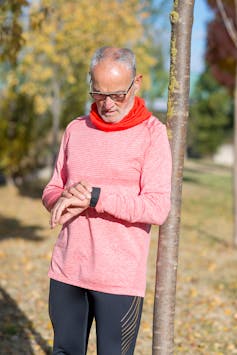Wearable trackers and monitors (like smartwatches) are increasingly popular and sophisticated. For people living with heart disease, they can provide important information, including updates on heart rate and rhythm abnormalities.
But a recent study published in Journal of the American Heart Association It found that using wearable devices to monitor heart conditions such as atrial fibrillation – an irregular heartbeat – can actually make people more anxious about their health.
It’s a catch-22: the wearable device can help you better manage your chronic heart condition, but using it could cause you stress — which is bad for these conditions.
So what are the tradeoffs? And how can we get the most out of wearables, without unnecessary worries?
Wearables for heart disease monitoring
Wearables are playing an increasing role in management and detection conditions such as atrial fibrillation, h more common heart rhythm problem.
Atrial fibrillation affects about 2% of the general population and about 5% of people over the age of 55. Symptoms may include palpitations, fatigue, and shortness of breath, although some patients may live relatively symptom-free. Self-management is important to improve quality of life and prevent complications such as stroke and heart failure.
People with atrial fibrillation often have high rates as well stress related to their condition. Psychological distress – including symptoms of anxiety, depression and worry – affects between 25% and 50% of those living with the condition.
Wearable devices can help people understand and monitor their condition by providing heart rate and rhythm data and alerts to detect episodes of atrial fibrillation. This can be helpful in understanding the impact of their disease, particularly for those living with paroxysmal (or episodic) AF.
Angus Gray/unsplash
A study found that smartwatches were very effective at detecting irregular heart rhythms – and could help manage and even prevent them.
However, any benefits of using wearable devices to monitor atrial fibrillation must be balanced against the high rates of stress experienced by people with this condition to ensure that their use does not exacerbate psychological distress.
Wearables can empower patients
For many people, the feeling of receiving reliable, objective and personalized health data can be encouraging feelings of safety, security and assuranceespecially when combined with symptom trackers or patient diaries.
This can allow patients to self-manage their condition at home with their families, rather than spending time in hospital – reducing anxiety and stress.

Rafa Fernandez/shutterstock
In a clinical setting, data may also encourage patients to take part shared decision making. By interpreting health data together with doctors or other healthcare professionals, they can develop goals and action plans, including when to seek help from a GP – and when to go to hospital.
Patients who understand their condition tend to report fewer symptoms of atrial fibrillation.
But wearables can be stressful
The study, published in the Journal of the American Heart Association, looked at the behavior and well-being of 172 people with atrial fibrillation over a nine-month period.
It found that the 83 people who used mobile devices to monitor their condition were more worried about their symptoms and treatment, with one in five experiencing “severe anxiety”.
Chronic stress can contribute to stress, burnout and poor physical health, which in turn can worsen heart disease.
Previous research has also investigated the effects of wearables on patients with long-term conditions, including heart disease. Patients in this study similarly reported increased anxiety while using these devices, as one explained:
I’m one of those people who worry about things. I’m worried about myself […] and I thought this is stupid. This reminds me every day, […] I wonder what my reading is, how good it is or how bad it is […]. Every time I started thinking about it, I started thinking about my illness.
Some people too describe being a “prisoner of numbers”. They feel they “have to keep checking the device to see how they’re doing, so the device dominates their life.”
The volume and frequency of notifications, alarms and vibrations from mobile devices can be overwhelming and cause people to worry about their health.
Information overload can also discourage self-management, with notifications prompting people to seek health advice more often than they otherwise would. But that’s not necessarily a bad thing.
For other people, low levels of health or digital literacy – not knowing how to use devices or interpret data – can make them feel so stressed or anxious that ditch the wearables completely.
The future of wearables
In the future, digital devices may help create a holistic picture of health and wellness through a “digital phenotype” that combines data such as sleep patterns, weight changes and physical activity.
But more research is needed to understand the effects of wearables – including their notifications and alarms – on patients’ stress levels.
If you already use a mobile device for health monitoring, it may be helpful to regularly check your data and notification settings. You may want to discuss how you use your device to help you self-manage your condition with your doctor or nurse.
For any chronic disease, it is important to have a management action plan. This includes discussing with your healthcare professional when you should seek care (such as attending the emergency department or GP).
Meanwhile, there is still work to be done to help nurses and doctors feel more confident mobile device integration – and the data they provide – in patient care.
